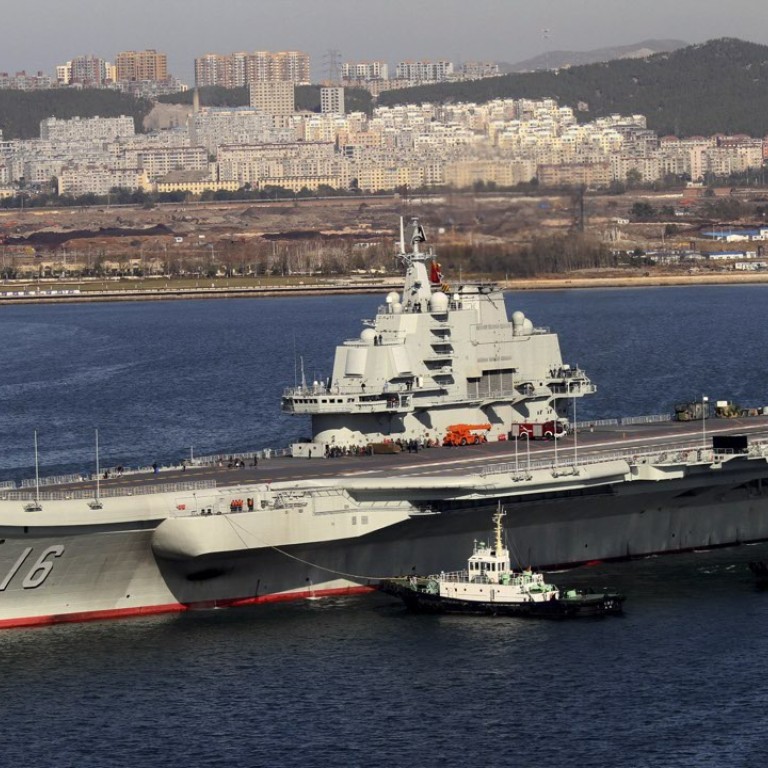
PLA officers make rare public show of disappointment at military budget increase
Xi Jinping showing army who’s boss: source
Military officers have taken the rare step of publicly registering disappointment at the increase in China’s defence budget.
Military figures and analysts said the “surprisingly low” budget increase indicated President Xi Jinping was not scared of offending senior military officials and was demonstrating his ability to control the army through economic means.
The National People’s Congress announced on Saturday that the defence budget would grow 7.6 per cent this year to 954 billion yuan (HK$1.1 trillion). That compared to a budget increase last year of 10.1 per cent and was the first single-digit increase since 2010, when it grew 7.5 per cent.
Major General Qian Lihua, former head of the foreign affairs office of the Ministry of National Defence, told a panel discussion of the Chinese People’s Political Consultative Committee yesterday that compared to last year’s increase, this year’s represented a “big reduction”.
READ MORE: China to boost maritime presence in disputed sea zone
“Some Western media predicted that China’s defence budget might increase up to 20 per cent before the opening of the NPC and CPPCC. The result is not only much, much lower than Western [media]’s prediction, but also a certain distance from my early expectation.”
Retired rear admiral Yin Zhuo, who like Qian is a national political adviser, said the growth in defence spending should be commensurate with the national economy – but it also needed to be proportional to the country’s “security need”.
“We should not let our military’s development stall... because the security challenges at our peripherals, especially at sea, have been increasing,” he told China National Radio.
Yin said China would not compete with the United States in building armaments, or for power status, but the current share of defence spending to GDP – which he put at 1.5 per cent – was still too low.
“I think 2 to 2.5 per cent would be optimum,” Yin said. “And we are slashing 300,000 military personnel – additional resources are needed to resettle these veterans.”
At Thursday’s opening of the CPPCC another delegate, Lieutenant General Wang Hongguang, former commander of Nanjing Military Command, said the People’s Liberation Army needed its budget to grow 20 per cent this year to cover its ongoing modernisation and challenges in the South and East China seas.
Xi, chairman of the powerful Central Military Commission, announced in September that 300,000 mostly non-combat troops would be cut from the PLA – part of an effort to overhaul the world’s largest army into a streamlined, modern force. That announcement followed the downfall of two of the former CMC vice-chairmen Xu Caihou and Guo Boxiong, and former deputy head of the army’s logistics, Gu Junshan, in Xi’s anti-graft campaign.
READ MORE: China’s military budget boost the lowest in six years
“It was a smart move to launch the anti-graft campaign ahead of the troop reduction, because some supercilious senior military officials were scared after the downfall of so many big tigers,” a source said, adding that Xi wanted to show the army he was in control of their livelihoods.
“Unlike Deng Xiaoping, who cut 1 million troops in the 1980s, Xi is a military leader with a civilian background, so he has to use the anti-graft campaign, which is supported by the public, and financial means to build his personal prestige.
The source said the lower than expected budget growth sent a message that, amid the economic slowdown, Xi would no longer be giving sweeteners to the army.
Both Wang and Qian highlighted challenges for the military, such as learning new operational concepts following its overhaul from seven military area commands into five theatres, and challenges in the East and South China seas, where China has territorial disputes with neighbours and the US is showing increasing involvement.
Macau-based military observer Antony Wong Tong said Xi’s approach was “high risk”.
“He is giving the PLA more tasks, but on the other hand, he is offering them fewer resources,”.
“It’s possible such a move could backfire if Xi fails to push all the senior officials in the army to listen to him.”


